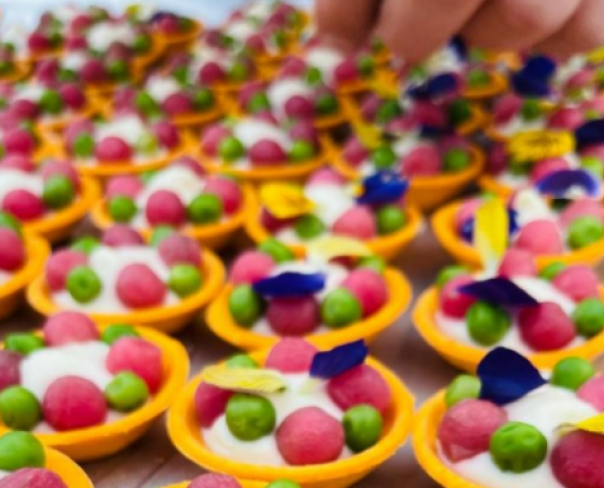
RHS Chelsea Flower Show, which took place from 21-26 September 2021, usually takes place in May but it was postponed due to the Covid-19 pandemic.
The Secret Garden Restaurant served up a sustainable menu designed to celebrate the harvest festival when ingredients are at their richest and most flavoursome. The team introduced more plant-based dishes than ever before and over the course of the six-day event they served more than 1,700 covers a day.
Guests attending the event had the choice of a wide array of hospitality packages, ranging from gourmet canapes to four-course lunches and afternoon teas. An open bar was also on hand, serving champagne and botanical cocktails.
Steve Hawkins, divisional managing director of Leisure and Airline Lounges for Sodexo Live!, said: “Jardin Blanc is one of the most magical places to visit at the RHS Chelsea Flower Show, so it was great to be back at the world’s greatest flower show.
“Raymond Blanc and the Sodexo Live! Team worked tirelessly to develop an extraordinary experience for guests that drove home the importance of preserving and protecting the environment that we love.”
As part of Jardin Blanc and Sodexo’s commitment to sourcing fresh, sustainable produce and mitigating food waste, the major event's team partnered with Full Circle Farm.
The farm, based in West Sussex and led by farmer and chief executive Tom Morphew, will see leftover ingredients from this year’s event used to create compost and fertiliser for next year’s crop of fruit and vegetables.
After the RHS Chelsea Flower Show concluded, Sodexo donated 1,728 kilograms of leftover food to City Harvest, which led to 4,112 meals being delivered to projects that feed people facing food poverty.
This ultimately led to 6,566 kilograms of greenhouse gas emissions being prevented by not needlessly sending good food to landfill sites.